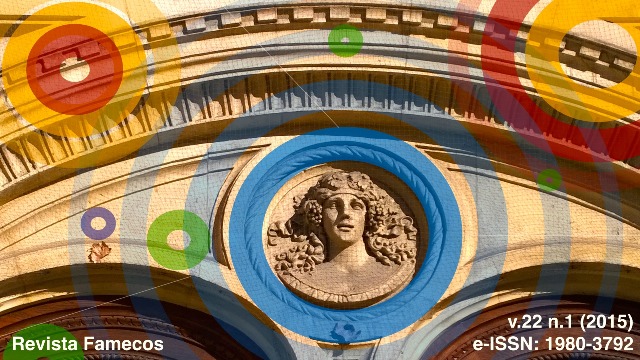The value of “egocard” affectivity and symbolic violence in “Off-Axis network”
DOI:
https://doi.org/10.15448/1980-3729.2015.1.19461Keywords:
Off-Axis network, Symbolic violence, ImaginaryAbstract
The Off-Axis network, made up of groups of cultural producers and activists who are active on the Brazilian alternative scene, has become widely known since 2013 through the use of Ninja Media – experience made within the network. How can the imaginary of brotherhood, union and complicity between the groups hide the use of symbolic violence to forge the image of cohesion and enhance the dynamics of organisation and mobilisation? To analyse the tensions and contradictions in the collaborative practices among members, research in the interdisciplinary field between Communication and Cultural History uses the method of documentary analysis on data obtained from interviews, participant observation and monitoring email lists and social networks. We conclude that, in an environment where working conditions are informal, based on pacts of honour and debts of gratitude, the imaginary fable from which they are establishing a historic and revolutionary movement, similar to modernism and tropicalism, represents the central motivation that legitimises symbolic violence in the name of an idealised cause.
Downloads
References
BACZKO, Bronislaw. Imaginação social. In: Enciclopédia Einaudi: Anthropos – Homem, v. 5. Lisboa: Imprensa Nacional/Casa da Moeda, 1985. p. 296-332.
BARCELLOS, R. de M. R. de; DELLAGNELO, E. H. do L. O surgimento do Circuito Fora do Eixo sob a ótica da Teoria Política do Discurso: uma reflexão. ENCONTRO NACIONAL DE PESQUISADORES EM GESTÃO-SOCIAL, 6. São Paulo/SP. Anais do 6º Encontro Nacional de Pesquisadores em Gestão-social. Juazeiro do Norete, 2012. Disponível em: http://anaisenapegs.com.br/2012/dmdocuments/120.pdf Acesso em: 10 mar. 2014.
BERGER, Peter L.; LUCKMANN, Thomas. A construção social da realidade. 4 ed. Petrópolis: Vozes, 1978.
BERNARDI, Tati. A gente não quer só cinema, a gente quer dinheiro. Folha de S. Paulo, São Paulo, 2 dez. 2013. Disponível em: http://www1.folha.uol.com.br/colunas/tatibernardi/2013/12/1379447-a-gente-nao-quer-so-cinema-a-gente-quer-dinheiro.shtml Acesso em: 28 fev. 2014.
BLOCK, Marc. Apologia da história: ou o ofício do historiador. Rio de Janeiro: Jorge Zahar, 2001.
BOURDIEU, Pierre. O poder simbólico. 8 ed, Rio de Janeiro: Bertrand Brasil, 2005.
______. Modos de dominação. In: A produção da crença: contribuição para uma economia dos bens simbólicos. Porto Alegre: Zouk, 2006.
______. A distinção: crítica social do julgamento. São Paulo: Edusp/Porto Alegre: Zouk, 2006.
BOCCHINI, Lino; LOCATELLI, Piero. Fora do eixo: ex-integrantes da entidade controladora do Mídia Ninja falam com exclusividade para Carta Capital e condenam práticas da organização. Carta Capital, São Paulo, 16 ago. 2013. Disponível em: http://www.cartacapital.com.br/sociedade/fora-do-eixo-6321.html Acesso em: 8 out. 2013.
CHARTIER, Roger. A história cultural: entre práticas e representações. Rio de Janeiro: Difel/Bertrand Brasil, 1985.
COSTA, Eliane. A causa coletiva: políticas públicas culturais para o cenário das redes sob a perspectiva da ecologia digital (a experiência brasileira). Cadernos Cenpec | Nova série, [S.l.], v. 1, n. 1, dez. 2011. Disponível em: http://wwwh.cadernos.cenpec.org.br/cadernos/index.php/cadernos/article/view/41/45 Acesso em: 10 mar. 2014.
DARNTON, Robert. O grande massacre dos gatos: e outros episódios da história cultural francesa. 2. ed. Rio de Janeiro: Graal, 1986.
GARLAND, Shannon. “The Space, the Gear, and Two Big Cans of Beer”: Fora do Eixo and the Debate over Circulation, Remuneration, and Aesthetics in the Brazilian Alternative Market. Journal of Popular Music Studies, v. 24, n. 4, p. 509-531, 2012.
GLOSSÁRIO Fora do Eixo. Universidade Fora do Eixo/Fora do Eixo Letras. s/d. Disponível em: https://docs.google.com/document/d/1a3FFIkLjl0gZ_UW1xDsBDA2uF4JMfOc1wNdcTuCbtQ/edit?hl=en&ndplr=1# Acesso em: 10 jan. 2013.
MAFFESOLI, Michel. O tempo das tribos: o declínio do individualismo nas sociedades pós-modernas. Rio de Janeiro: Forense, 2006.
MOREIRA, Sonia Virginia. Análise documental como método e como técnica. In: DUARTE, Jorge; BARROS, Antonio. Métodos e técnicas de pesquisa em Comunicação. São Paulo: Atlas, 2005.
OLIVEIRA, Cláudio. Economia Solidária se fortalece e ganha espaço em Mato Grosso. Diário de Cuiabá, Cuiabá, 19 ago. 2008. Disponível em: http://www.diariodecuiaba.com.br/detalhe.php?cod=323898 Acesso em: 20 dez. 2013.
SILVA, Juliana Vaz da; BENEVIDES, Rubens de Freitas. O universo dos festivais independentes. Emblemas: Revista do Departamento de História e Ciências Sociais - UFG/CAC, v. 9, n. 2, 2012. Disponível em:http://www.revistas.ufg.br/index.php/emblemas/article/view/28542/16028 Acesso em: 10 mar. 2014.
SINGER, Paul. Introdução à economia solidária. São Paulo: Editora Fundação Perseu Abramo, 2002.
WANDERLEI, Gustavo Tomé. Dinâmicas de espaços culturais independentes. In: VASCONCELOS, Ana; GRUMAN, Marcelo. Políticas para as artes: prática e reflexão. Rio de Janeiro: Funarte, 2012.
WEBER, Max. Ciência e política: duas vocações. São Paulo: Cultrix, 1993.
YÚDICE, George. Translator’s introduction. In: CANCLINI, Nestor Garcia. Imagined Globalization. Duke University Press, 2014. Disponível em: http://stage.dukeupress.edu/Assets/PubMaterials/978-0-8223-5473-4_601.pdf Acesso em: 25 fev. 2014.
Downloads
Published
How to Cite
Issue
Section
License
Copyright
The submission of originals to Revista Famecos implies the transfer by the authors of the right for publication. Authors retain copyright and grant the journal right of first publication. If the authors wish to include the same data into another publication, they must cite Revista Famecos as the site of original publication.
Creative Commons License
Except where otherwise specified, material published in this journal is licensed under a Creative Commons Attribution 4.0 International license, which allows unrestricted use, distribution and reproduction in any medium, provided the original publication is correctly cited.






